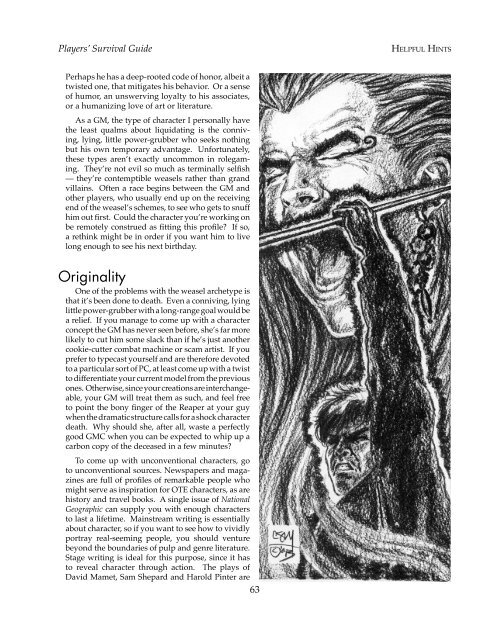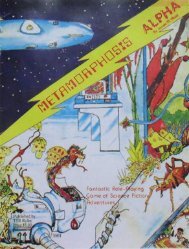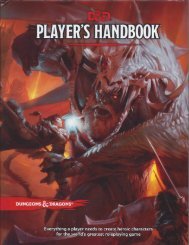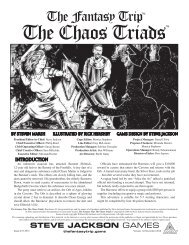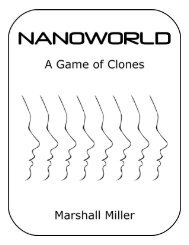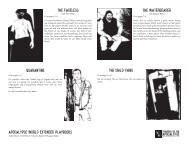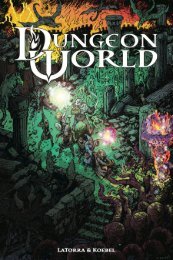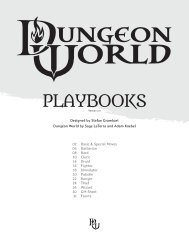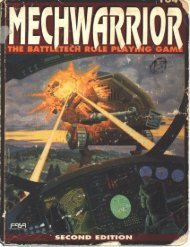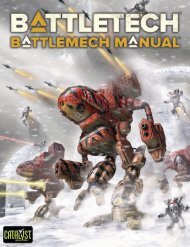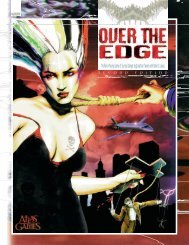Over_the_Edge_Players'_Survival_Guide
Player's guide to Over the Edge rpg
Player's guide to Over the Edge rpg
You also want an ePaper? Increase the reach of your titles
YUMPU automatically turns print PDFs into web optimized ePapers that Google loves.
Players’ <strong>Survival</strong> <strong>Guide</strong><br />
HELPFUL HINTS<br />
Perhaps he has a deep-rooted code of honor, albeit a<br />
twisted one, that mitigates his behavior. Or a sense<br />
of humor, an unswerving loyalty to his associates,<br />
or a humanizing love of art or literature.<br />
As a GM, <strong>the</strong> type of character I personally have<br />
<strong>the</strong> least qualms about liquidating is <strong>the</strong> conniving,<br />
lying, little power-grubber who seeks nothing<br />
but his own temporary advantage. Unfortunately,<br />
<strong>the</strong>se types aren’t exactly uncommon in rolegaming.<br />
They’re not evil so much as terminally selfish<br />
— <strong>the</strong>y’re contemptible weasels ra<strong>the</strong>r than grand<br />
villains. Often a race begins between <strong>the</strong> GM and<br />
o<strong>the</strong>r players, who usually end up on <strong>the</strong> receiving<br />
end of <strong>the</strong> weasel’s schemes, to see who gets to snuff<br />
him out first. Could <strong>the</strong> character you’re working on<br />
be remotely construed as fitting this profile? If so,<br />
a rethink might be in order if you want him to live<br />
long enough to see his next birthday.<br />
Originality<br />
One of <strong>the</strong> problems with <strong>the</strong> weasel archetype is<br />
that it’s been done to death. Even a conniving, lying<br />
little power-grubber with a long-range goal would be<br />
a relief. If you manage to come up with a character<br />
concept <strong>the</strong> GM has never seen before, she’s far more<br />
likely to cut him some slack than if he’s just ano<strong>the</strong>r<br />
cookie-cutter combat machine or scam artist. If you<br />
prefer to typecast yourself and are <strong>the</strong>refore devoted<br />
to a particular sort of PC, at least come up with a twist<br />
to differentiate your current model from <strong>the</strong> previous<br />
ones. O<strong>the</strong>rwise, since your creations are interchangeable,<br />
your GM will treat <strong>the</strong>m as such, and feel free<br />
to point <strong>the</strong> bony finger of <strong>the</strong> Reaper at your guy<br />
when <strong>the</strong> dramatic structure calls for a shock character<br />
death. Why should she, after all, waste a perfectly<br />
good GMC when you can be expected to whip up a<br />
carbon copy of <strong>the</strong> deceased in a few minutes?<br />
To come up with unconventional characters, go<br />
to unconventional sources. Newspapers and magazines<br />
are full of profiles of remarkable people who<br />
might serve as inspiration for OTE characters, as are<br />
history and travel books. A single issue of National<br />
Geographic can supply you with enough characters<br />
to last a lifetime. Mainstream writing is essentially<br />
about character, so if you want to see how to vividly<br />
portray real-seeming people, you should venture<br />
beyond <strong>the</strong> boundaries of pulp and genre literature.<br />
Stage writing is ideal for this purpose, since it has<br />
to reveal character through action. The plays of<br />
David Mamet, Sam Shepard and Harold Pinter are<br />
63


